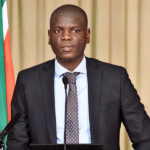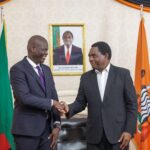President Hakainde Hichilema’s administration is grappling with a serious communication crisis. Despite having appointed various communication professionals over the years, the government has struggled to effectively convey its message, leading to mounting frustrations among citizens. In an attempt to remedy the situation, President Hichilema has hired a Kenyan-based communications consulting firm, Gina Din Corporate Communications (GDCC), to restructure the government’s communication strategy.
This move comes at a time when the government’s failure to deliver on key campaign promises has led to widespread public dissatisfaction. From rising food prices and inflation to shortages of medicines and failing agricultural programs, the government’s inability to effectively communicate its progress—or lack thereof—has exacerbated the situation.
A Brief History of Communication Failures
Hichilema’s initial appointments for communications roles seemed promising, with Anthony Bwalya appointed as Special Assistant for Press and Public Relations. However, this was short-lived, and Bwalya was soon replaced by Clayson Hamasaka, whose performance fell short of expectations. The Ministry of Information and Media, led by Chushi Kasanda, also faced criticism for her lack of preparedness and understanding of the communication landscape. In response, a new position was created to complement Kasanda—Director Spokesperson—and Thabo Kawana, the spokesperson for the UPND Alliance, was appointed.
Despite these efforts, the communication challenges only deepened. As the economy struggled and national crises mounted, President Hichilema’s government faced increasing pressure, and communication gaps widened. The economic situation, marked by inflation, power shortages, and rising debt, created an information void that the administration failed to fill effectively.
Creating More Layers of Bureaucracy
In a bid to streamline operations and ensure delivery of promises, the President established the Presidential Delivery Unit (PDU) in March 2023, a new body designed to track government progress. While intended to act as a bridge between State House, Cabinet, and various ministries, the PDU has been criticized for adding another layer of bureaucracy without offering tangible solutions to the systemic issues.
The creation of the PDU, alongside other communication appointments, illustrates a broader trend within the government to address problems with more bureaucracy rather than solving the root causes of its communication and governance failures. This “layering” approach seems to be more about creating the appearance of action than making meaningful change.
Gina Din Corporate Communications: A Foreign Intervention
The latest attempt to resolve the government’s communication crisis involves hiring Gina Din-Kariuki’s Kenyan firm, GDCC, to overhaul the communication strategy. This move is seen by many as an admission of failure on the part of the government’s communication team and an acknowledgment that internal efforts have been insufficient.
Gina Din, a well-known figure in strategic communication in Kenya, is tasked with providing training to Ministers and Permanent Secretaries on how to better deliver government messages and manage public relations. However, the decision to hire a foreign firm has raised concerns about the government’s ability to solve its own problems and has been seen as a superficial fix rather than a long-term solution.
The Real Challenge: Substance Over Style
Critics argue that President Hichilema’s government is missing the bigger picture. While hiring PR experts may improve the appearance of communication, it does not address the fundamental issues of governance. Public frustration is driven by tangible issues such as economic hardship, lack of basic services, and unmet promises—issues that cannot be solved by polished press releases or media strategies alone.
The continued failure of the government to provide real solutions to the problems facing the country suggests that communication is not the only problem—it is a symptom of deeper governance issues. Public relations may improve the government’s image in the short term, but without substantive progress on the ground, it is unlikely to quell public discontent.
Looking Ahead: Can Communication Fix What’s Broken?
For Hichilema, the most significant PR success will not come from hiring external consultants, but from addressing the real problems that affect the Zambian people. Effective communication will only be truly valuable if it is backed by concrete actions that improve the lives of citizens. Until then, the hiring of a Kenyan PR firm might be seen as yet another attempt to cover up the government’s failure rather than a genuine effort to improve its communication strategy.
As Zambia faces a myriad of challenges, it is clear that communication is only one piece of the puzzle. Without addressing the underlying issues and delivering on its promises, the government risks losing the trust of the people, no matter how expertly its messages are crafted.






